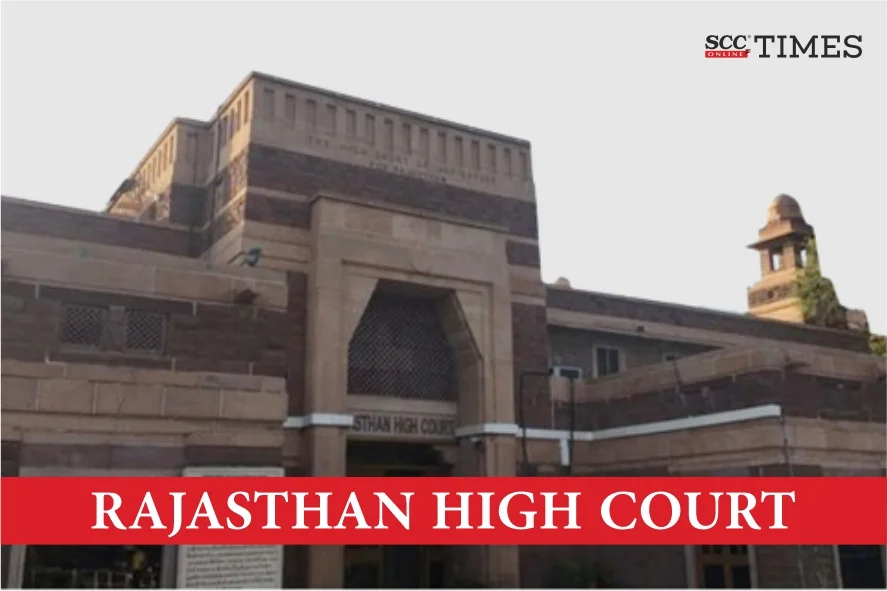Rajasthan High Court: In a criminal appeal preferred by the appellants against the judgment of conviction and sentence dated 26-11-1993, Ganesh Ram Meena, J.*, noted that in the present case, after conviction of the appellants their sentence was suspended, and they were released on bail vide order dated 13-12-1993. The Court opined that since after their release on bail, the appellants were living in the society peacefully without there being any criminal antecedents to their discredit. There was no bar under law to extend the benefit of probation to convict of above twenty-one years. Thus, taking into due consideration the legislative intent of the Probation of Offenders Act, 1958 (‘the Act’), the Court deemed it appropriate to extend the benefit of probation to the appellants under Section 4 of the Act, and accordingly directed that the appellants should be released on probation under Section 4 of the Act, upon furnishing a personal bond of Rs. 50,000 each and two sureties in the sum of Rs. 25,000 each to the satisfaction of the Trial Court.
Background
In the present case, the criminal appeal was preferred by the appellants against judgment of conviction and sentence dated 26-11-1993 passed by the Special Judge, Prevention of Scheduled Castes/ Scheduled Tribes, Prevention of Atrocities, Jaipur (‘the Trial Court’), whereby the appellants were convicted under Section 307 of the Penal Code, 1860 (‘IPC’). Further, on filing of appeal, the sentence awarded to the appellants was suspended vide order dated 13-12-1993, and they were released on bail.
Even though the appeal was filed to set aside the conviction and sentence, the appellants submission was confined to the grant of benefit of probation to the appellants under the provisions of Probation of Offenders Act, 1958 (‘the Act’). The appellants submitted that except the present case, no case had been registered against the appellants, and they were living peacefully in the society without there being any criminal antecedents to their discredit. Further, it was submitted that the appellants had faced trial for three years and against the impugned judgment, they preferred the appeal in 1993. Thus, from the last thirty-three years, the appellants were facing mental agony and harassment because of pendency of criminal case registered against them. It was submitted that Appellant 1 was fifty-nine years and Appellant 2 was fifty-six years, thus the appellants might be given the benefit of probation under the provisions of the Act.
However, the respondent submitted that looking to the allegations and the manner in which the incident took place, the appellants were not entitled for any kind of leniency in awarding sentence and the benefit of probation under Section 4 of the Act.
Analysis, Law, and Decision
The Court opined that statement of objects and reasons of the Act explained the rationale for the enactment and its amendments, which was to release the offenders on probation for good conduct instead of sentencing them to imprisonment. Thus, increasing emphasis on the reformation and rehabilitation of offenders as useful and self-reliant members of society without subjecting them to the deleterious effects of jail life was sought to be subserved.
The Court opined that main object of sentencing a convicted person was to bring in him certain character reformation and keep him away from the society, to see that the impact of his criminal character did not put any adverse impact on any other person. The Court noted that in the present case, after conviction of the appellants their sentence was suspended and they were released on bail vide order dated 13-12-1993, and opined that since after their release on bail, they were living in the society peacefully without there being any criminal antecedents to their discredit. There was no bar under law to extend the benefit of probation to convict of above twenty-one years.
Thus, taking into due consideration the legislative intent of the Act, the Court extended the benefit of probation to the appellants under Section 4 of the Act, and accordingly directed that the appellants should be released on probation, upon furnishing a personal bond of Rs. 50,000 each and two sureties in the sum of Rs. 25,000 each to the satisfaction of the Trial Court. Further, undertaking should be provided that they should maintain peace and good behaviour for a period of two years and should not repeat the offence. The Court stated that the appellants were allowed two months’ time to furnish bail bonds, sureties and undertakings, and since the appellants were on bail they need not to surrender, and their bail bonds stood cancelled accordingly.
[XYZ v. State of Rajasthan, 2024 SCC OnLine Raj 447, decided on 19-02-2024]
*Judgment authored by- Justice Ganesh Ram Meena
Advocates who appeared in this case:
For the Appellants: V.R. Bajwa, Senior Advocate assisted by Amar Kumar and Savita Nathawat, Advocates;
For the Respondents: Babulal Nasuna, Advocate.








